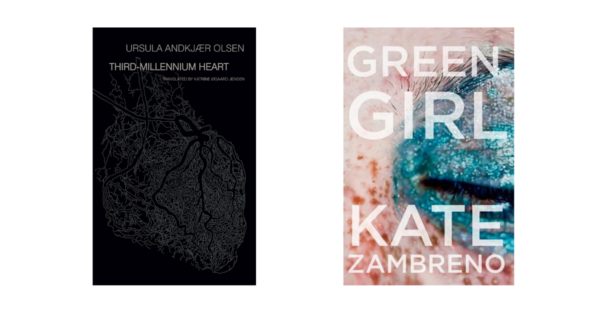
“No one should affect the pattern of my screams.”
“That is the structure, continued.”-Third-Millennium Heart (69, 21)
I’m thinking about the women in Third-Millennium Heart (by Ursula Andkjær Olsen transl. Katrine Øgaard Jensen) and Green Girl (by Kate Zambreno).
Each text uses repetition. Each instance of repetition seems essential to the gendered existence of these books’ characters: namely the speaker of Third-Millennium Heart and Green Girl’s Ruth.
In Third-Millennium Heart, the speaker enacts her own transformations, citing at several points achieving a “new body language” (74, 114, 125). In Green Girl, the narrator consistently manipulates a character named Ruth, pushing her fictional character towards her limits—as if Ruth is an actress in a reality television show and the narrator is her sadistic choreographer. Ruth uses repetition to assert her agency, despite the narrator’s commentary.
From Third-Millennium Heart:
The idea of exits with no openings. […]
I dream of this: safety, no one coming in, nothing flowing. (34)The will to have no openings, to have no areas where humiliation
and assault can take place. (62)
From Green Girl:
I am fine, fine, fine, fine, fine. The green girl is a liar. (13)
To be closed off so that no violence can permeate the self. To be self-contained. Olsen grapples with the complexity of this closed-off-ness, as translated by Jensen: “do I exist / inside myself?” (178). The more these aims of “nothing flowing” and “fine, fine, fine” persist, I wonder if a kind of self-deluding is in effect.
What does Ruth believe about herself? “Best to go blank, to retreat inside” (9).
This nothing, this blankness, seems to allow the women to continue—to survive not as victims but as violators of themselves.* This nothing, this blankness, seems to allow the women to continually become new. To aggressively become.
Where the speaker of Third-Millennium Heart seeks to simultaneously be pregnant and to penetrate, Ruth seeks to perform the blank; she shaves her head, destroys her virginal hair.
To become an army […]
to penetrate everything.
That is my new body language. (125)
Is it masochistic? An act of self-flagellation. (163)
Ultimately, these processes of becoming push against the limits of the books they’re bound by. Repetition seems essential to these women’s transformations, beyond the finitude of the book form. Neither the speaker of Third-Millennium Heart nor Green Girl’s Ruth are ready to conclude. Olsen (transl. Jensen) and Zambreno, thus, suggest continuation rather than conclusion.
Jensen translates: “we need more time” (204).
Zambreno writes, from Ruth’s voice: “I want to […] scream. And scream. And scream” (273).
Now, I’m listening to Kim Gordon’s “Cookie Butter.” Gordon speaks in algebraic form: I approach / I fuck / I think / I won’t. The song ends in churning industrial sound. Gordon brings us to the gulf of sound by speaking I hide / industrial / metal / supplies. This kind of churning, a gesture towards Ruth’s scream. A gesture towards more time.
**“The goal is to be the violator rather than be the victim” (44)
AM Ringwalt is a writer and musician. Her words appear or are forthcoming in Peripheries, the Washington Square Review and the Bennington Review. Called “unsettling” by NPR and “haunted” by The Wire, she has performed her music at the Watermill Center and the New Yorker Festival. @amringwalt